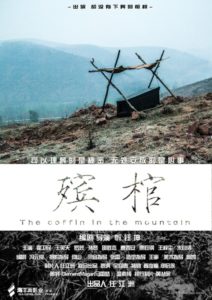The Coffin in the Mountain
殡棺
China, 2014, colour, 2.35:1, 120 mins.
Director: Xin Yukun 忻钰坤.
Rating: 6/10.
Black village comedy is cleverly plotted but cramped by arty-indie direction.
A village in Henan province, central China, the present day, winter. Pregnancy 怀孕. Xiao Zongyao (Wang Xiaotian), son of upright, much-decorated village chief Xiao Weiguo (Huo Weimin), returns home to hear that today is the funeral of a local, Sun, who died on a perilous part of a nearby mountain. Xiao Zongyao doesn’t get on with his father, who found him a job down in town and is now trying to find him a girlfriend there as well. Before the funeral, local businessman Wang Baoshan (Shao Shengjie) publicly insults a local girl, Huang Huan (Luo Yun), who storms off. She is actually Xiao Zongyao’s girlfriend, and that night in the forest she tells him she’s pregnant and he must take responsibility for the baby. They’re overheard by local weasel Bai Hu (Zhu Ziqing), who demands RMB10,000 to keep his mouth shut; in a struggle, Bai Hu accidentally dies, and Xiao Zongyao and Huang Huan conceal his body with brushwood. Xiao Zongyao and Huang Huan stay at a hotel down in town, where she discovers she’s not  pregnant after all but doesn’t tell Xiao Zongyao. The next morning, he can’t find one of his father’s medals that he borrowed, and worries it may be at the scene of the accident. Meanwhile, he collects a loan from a friend and buys two tickets to Guangzhou for the next day. Not being pregnant, Huang Huan is less keen to run away; without telling Xiao Zongyao the truth, she persuades him to stay and confess what happened. On their way back to the village, they’re surprised to see a funeral procession for Bai Hu, who everyone believes died from an accident while drunk. Secrets 心事. On the night of the accident, Wang Baoshan, whose wife Xiaofeng (Zheng Yiqian) is heavily pregnant, is having sex with his mistress Li Qin (Sun Li), wife of the lame Chen Zili (Cao Xi’an), who beats her. She tells Wang Baoshan she’s often thought of killing Chen Zili; he says it would be easy to fake an accident on the mountain. When the charred remains of a body are found in the forest the next morning, they’re assumed to be Huang Huan, who’s gone missing from the village; locals accuse Wang Baoshan of murdering her, and Li Qin, the only person who can give him an alibi, says she was alone the previous night. When the remains are later identified as Chen Zili’s (from an ID card), Li Qin is secretly delighted. Shopkeeper Zhuang (Jia Zhigang), who’s always liked Li Qin, makes his move on her; but after driving back from town, where he’s bought her a gold bracelet, he’s surprised to see Chen Zili alive and well, hitching a ride back to the village after spending the night with his mistress Maomao. Zhuang gives him a lift, with unexpected consequences. Later, Li Qin says she has no idea whose remains are inside the coffin and officially delivers it back to Xiao Weiguo, the village chief. But then Bai Hu’s brother, Bai Guoqing (Wang Zichen), pays a call on Xiao Weiguo and asks if he can borrow the body inside. The Coffin in the Mountain 殡棺. The night of his death, Bai Hu had amassed RMB25,000 in gambling debts in town, which his creditor now wants back. Thinking Bai Hu is in hiding, he tells Guoqing that he’ll burn down the Bai family’s house unless the debt is settled within 24 hours. Bai Guoqing asks Xiao Weiguo whether he can borrow the body in the coffin to fake his brother’s death. But as Xiao Weiguo well knows, there’s no longer a body of any type inside the coffin.
pregnant after all but doesn’t tell Xiao Zongyao. The next morning, he can’t find one of his father’s medals that he borrowed, and worries it may be at the scene of the accident. Meanwhile, he collects a loan from a friend and buys two tickets to Guangzhou for the next day. Not being pregnant, Huang Huan is less keen to run away; without telling Xiao Zongyao the truth, she persuades him to stay and confess what happened. On their way back to the village, they’re surprised to see a funeral procession for Bai Hu, who everyone believes died from an accident while drunk. Secrets 心事. On the night of the accident, Wang Baoshan, whose wife Xiaofeng (Zheng Yiqian) is heavily pregnant, is having sex with his mistress Li Qin (Sun Li), wife of the lame Chen Zili (Cao Xi’an), who beats her. She tells Wang Baoshan she’s often thought of killing Chen Zili; he says it would be easy to fake an accident on the mountain. When the charred remains of a body are found in the forest the next morning, they’re assumed to be Huang Huan, who’s gone missing from the village; locals accuse Wang Baoshan of murdering her, and Li Qin, the only person who can give him an alibi, says she was alone the previous night. When the remains are later identified as Chen Zili’s (from an ID card), Li Qin is secretly delighted. Shopkeeper Zhuang (Jia Zhigang), who’s always liked Li Qin, makes his move on her; but after driving back from town, where he’s bought her a gold bracelet, he’s surprised to see Chen Zili alive and well, hitching a ride back to the village after spending the night with his mistress Maomao. Zhuang gives him a lift, with unexpected consequences. Later, Li Qin says she has no idea whose remains are inside the coffin and officially delivers it back to Xiao Weiguo, the village chief. But then Bai Hu’s brother, Bai Guoqing (Wang Zichen), pays a call on Xiao Weiguo and asks if he can borrow the body inside. The Coffin in the Mountain 殡棺. The night of his death, Bai Hu had amassed RMB25,000 in gambling debts in town, which his creditor now wants back. Thinking Bai Hu is in hiding, he tells Guoqing that he’ll burn down the Bai family’s house unless the debt is settled within 24 hours. Bai Guoqing asks Xiao Weiguo whether he can borrow the body in the coffin to fake his brother’s death. But as Xiao Weiguo well knows, there’s no longer a body of any type inside the coffin.
REVIEW
A black comedy – played completely straight – of death, deception, cupidity, sex and guilt in a small village in central China, The Coffin in the Mountain 殡棺 is a striking first feature that would have been even better if its writer-director, 30-year-old Xin Yukun 忻钰坤, had loosened the brakes just a little. Xin, a graduate in photography from Beijing Film Academy, spent three years working on the script (with co-writer Feng Yuanliang 冯元良), and it shows: the result, apparently inspired by such ingenious movies as the US indie thriller 11:14 (Greg Marcks, 2003), is a meticulously constructed brainteaser that starts from a small event and gradually reveals hidden layers like an onion. The film is far from being a peasant-poverty Chinese indie as its publicity suggests; so more’s the pity that Xin hasn’t fully capitalised on the promise inherent in the script.
The film can be enjoyed on a pure writing level, as the complex plot clicks satisfyingly into place and almost everyone in the small mountain community is shown to be guilty of something. There’s rarely any sense of strain in the way the characters are moved around the chessboard and, after all the deaths, plotting and deception, the film satisfyingly completes the circle by returning to the fraught father-son relationship of the beginning, with the two now bound by a mutual complicity. As in many rural dramas, it’s made clear that little will get beyond the village limits, and Xin plays with this idea throughout. But however cleverly the screenplay is constructed, it’s still no more than the exact sum of its parts, a box of tricks with no other relevance (social, political, emotional) beyond its pure plotting.
Even with the script pulling rabbits out of the hat at regular intervals, the film still feels over-long at times. At two hours, the performances and the film-making need to breathe more, and realise their ironic potential in a more obvious way. Too often Xin cramps his own movie’s potential with a pre-determined, arty-realist directing style that does the material no favours, rather than letting the material dictate the style and enable the black comedy to really sing. It’s a common film-school mistake.
Performances by the no-name cast blend into a convincing ensemble while retaining a strong individuality. The early going is dominated by younger players Wang Xiaotian 王笑天 and Luo Yun 罗芸, both strong as the hapless hero and his conniving “pregnant” girlfriend; after the opening 30-minute episode, however, it’s the older players who take over the film as the plot really starts to thicken. Shao Shengjie 邵胜杰 and Sun Li 孙黎 are both memorable as a two-timing husband and his equally two-timing mistress, as is Jia Zhigang 贾致钢 as a dim-looking shopkeeper who later makes a romantic play for the mistress. But the performance that quietly comes into its own by the end is that by Huo Weimin 霍卫民 as the upright village chief who tries to ensure that what happened in the village stays in the village.
Production values are spare but solid, with naturalistic widescreen photography by He Shan 何山 of russety, wintry locations in Ye county, Henan province, central China, that’s weakened only by some obvious day-for-night work in the surrounding forest. Occasional ominous music by composer/sound designer Zhang Lei 张雷 could have been used more to point up the black humour. The film’s Chinese title (and that of the third episode) means just “Coffin”.
[For release in China, 10 minutes were cut and the film was retitled Deep in the Heart 心迷宫. It took just under RMB10 million, a respectable amount for such a film, at the box office.]
CREDITS
Presented by Sea Level Picture (CN). Produced by 1984 Studio (CN).
Script: Xin Yukun, Feng Yuanliang. Original story: Lu Nifan. Photography: He Shan. Editing: Xin Yukun. Music: Zhang Lei. Art direction: Guo Kai. Styling: Wang Ning. Costumes: Cao Ruichun. Sound: Zhang Lei.
Cast: Huo Weimin (Xiao Weiguo), Wang Xiaotian (Xiao Zongyao, Xiao Weiguo’s son), Luo Yun (Huang Huan, Xiao Zongyao’s girlfriend), Yang Yuzen (Xiao Zongyao’s mother), Sun Li (Li Qin, Wang Baoshan’s mistress), Cao Xi’an (Chen Zili, Li Qin’s lame husband), Jia Zhigang (Zhuang, shopkeeper), Shao Shengjie (Wang Baoshan), Zhu Ziqing (Bai Hu), Wang Zichen (Bai Guoqing), Zheng Yiqian (Xiaofeng, Wang Baoshan’s wife).
Premiere: First Film Festival, Xining, China, 24 Jul 2014.
Release: China, 16 Oct 2015.
